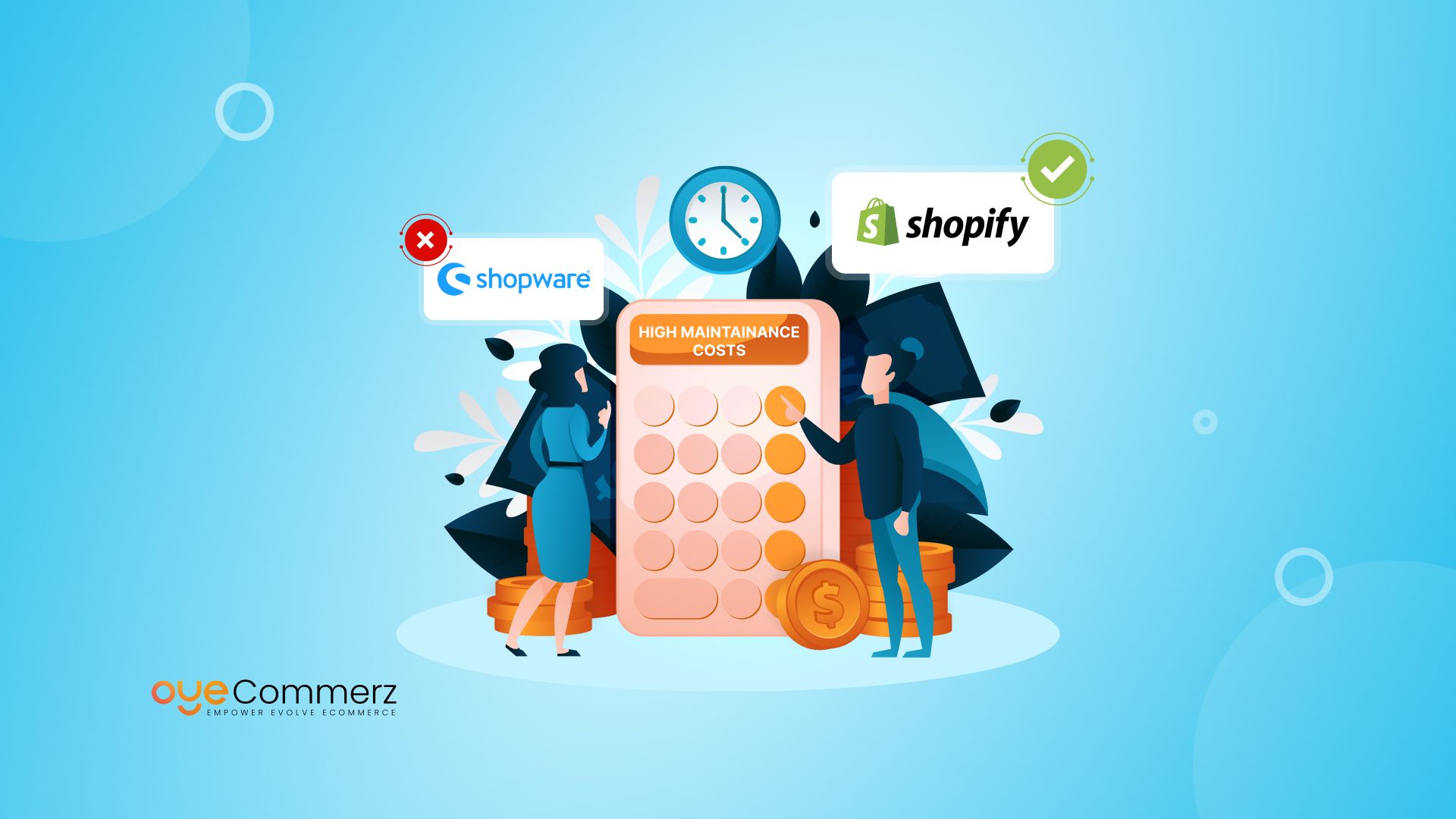Running an online store isn’t just about having a sleek website, it’s about keeping it running smoothly without burning a hole in your pocket. For many eCommerce businesses, Shopware has long been a go-to solution, offering flexibility and customization through its open-source framework. But beneath the surface lies a growing concern: the high maintenance costs in Shopware. These costs can quietly eat into your margins, demanding constant developer involvement, manual updates, and unpredictable expenses.
That’s where Shopify enters the picture. Known for its simplicity and scalability, Shopify is the cost-effective choice more businesses are gravitating toward. But is it really that much better?
In this blog, we’ll break down the hidden and obvious costs of running a Shopware store, compare them side-by-side with Shopify, and explore why making the switch could mean saving thousands, while gaining time, control, and peace of mind.
Table of Contents
ToggleUnderstanding Shopware Maintenance Costs
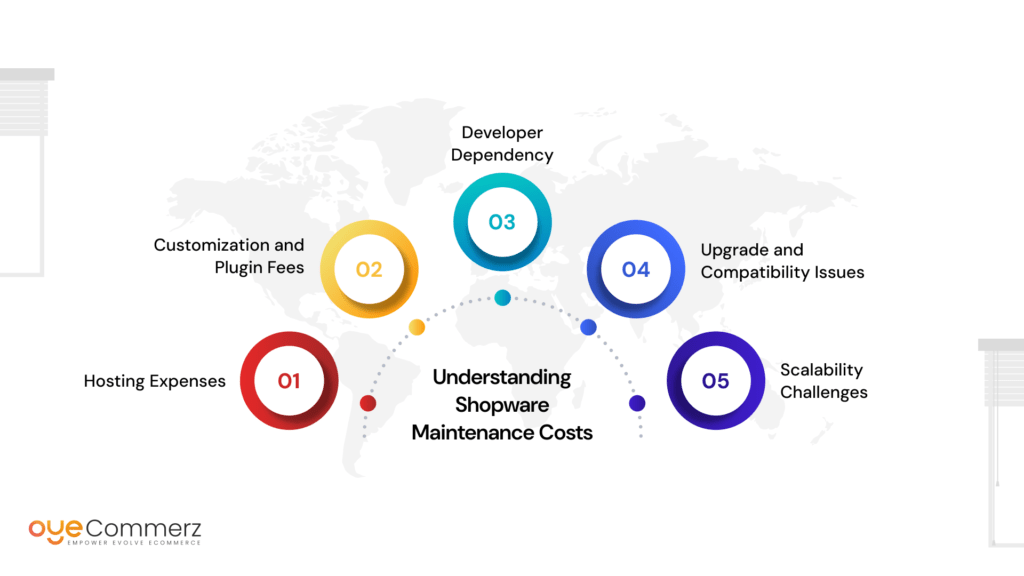
Shopware is a popular e-commerce platform, especially among businesses that need advanced customization and scalability. However, despite its robust features, high maintenance costs in Shopware often become a significant pain point for business owners as it slow business. Let’s break down the common factors contributing to these costs:
1. Hosting Expenses
Shopware requires self-managed hosting, which means businesses need to invest in dedicated servers or cloud solutions. The hosting costs can vary depending on the size of the store, traffic volume, and server requirements, often leading to unpredictable monthly expenses.
2. Customization and Plugin Fees
While Shopware offers a high degree of customization, achieving a tailored e-commerce experience often involves hiring developers. Custom themes, plugins, and integrations can quickly add up, making it challenging for small to mid-sized businesses to maintain their budgets.
3. Developer Dependency
Unlike some platforms with intuitive interfaces, Shopware’s customization and troubleshooting often require specialized technical expertise. Hiring skilled developers to maintain and update the platform can lead to recurring costs.
4. Upgrade and Compatibility Issues
Shopware releases periodic updates, but implementing these updates is not always straightforward. Ensuring compatibility with plugins, themes, and third-party integrations during upgrades often incurs additional costs, delaying business operations in the process.
5. Scalability Challenges
As businesses grow, their e-commerce platforms must scale to meet increasing demands. With Shopware, scaling often involves upgrading hosting plans, optimizing code, and potentially overhauling parts of the system—all of which contribute to rising maintenance expenses.
By understanding these cost drivers, it becomes clear why Shopify is cost effective alternative.
Audience New to E-Commerce
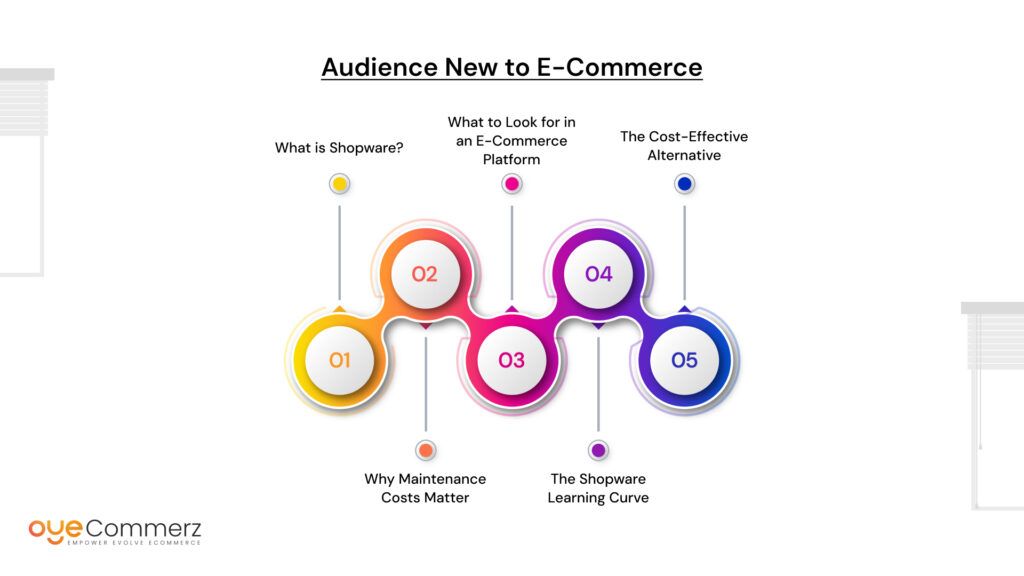
If you’re new to e-commerce and exploring platforms for your online store, understanding potential costs and challenges is crucial to making the right decision. While platforms like Shopware are powerful, high maintenance costs in Shopware can catch new businesses off guard. Here’s what you need to know to set your e-commerce journey up for success:
1. What is Shopware?
Shopware is an open-source e-commerce platform known for its flexibility and customization options. It’s a popular choice for businesses that need highly tailored online stores. However, with great flexibility comes complexity, often requiring technical expertise and increased maintenance costs.
2. Why Maintenance Costs Matter
For newcomers, maintenance costs can significantly impact your budget and profitability. In Shopware, these costs are influenced by:
- Hosting fees that vary based on traffic and storage needs.
- The expense of customizing your store to reflect your brand.
- Ongoing developer fees for updates, troubleshooting, and scaling.
3. What to Look for in an E-Commerce Platform
As someone starting out, here are key factors to consider:
- Ease of Use: Does the platform offer an intuitive interface that you can manage yourself, or will you need to hire technical experts?
- Cost Predictability: Are the platform’s maintenance costs straightforward, or do they come with hidden fees like those in Shopware?
- Scalability: Can the platform grow with your business without requiring major upgrades or technical overhauls?
- Support System: Does the platform provide reliable customer support, or will you rely heavily on third-party developers?
4. The Shopware Learning Curve
While Shopware is robust, it can be overwhelming for beginners. Tasks like setting up hosting, choosing plugins, and managing upgrades often require a steep learning curve, adding time and expenses to your journey.
5. The Cost-Effective Alternative
If high maintenance costs in Shopware sound intimidating, consider platforms like Shopify. With its user-friendly interface, predictable pricing plans, and inclusive features like hosting and 24/7 support, Shopify makes it easier for new entrepreneurs to focus on growing their business rather than worrying about technical complexities.
Starting your e-commerce store should be exciting, not a struggle with maintenance costs. Evaluating the true cost of ownership in platforms like Shopware can save you from unexpected challenges down the road.
Challenges with Shopware
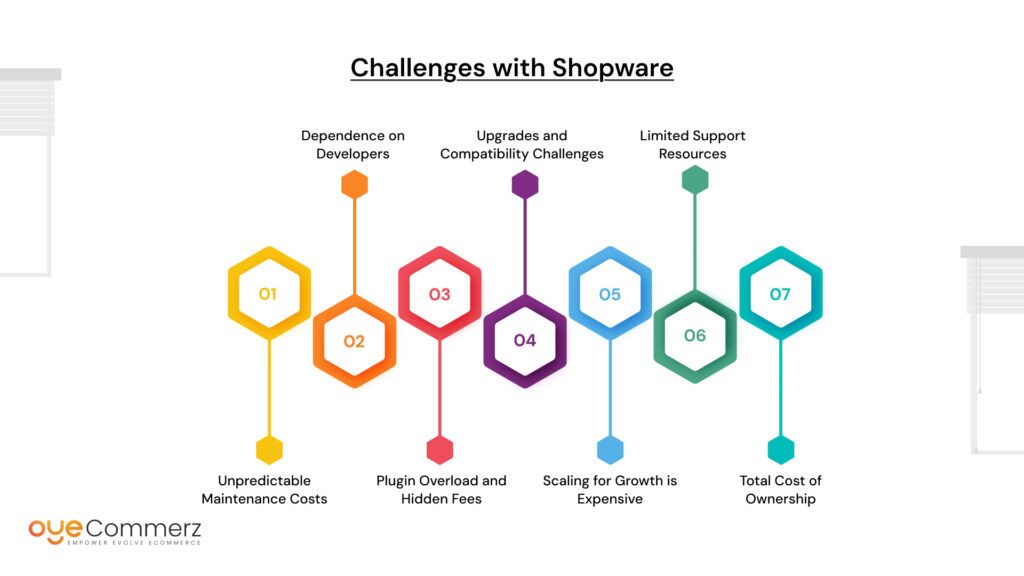
While Shopware is a powerful e-commerce platform, its complexity and operational requirements can present significant challenges, particularly for businesses looking to manage their costs effectively. One of the most common concerns is the high maintenance costs in Shopware, which can impact profitability and scalability. Let’s explore these challenges in detail:
1. Unpredictable Maintenance Costs
Shopware’s self-hosted nature requires businesses to manage their own servers. As traffic grows, hosting costs can skyrocket, adding a layer of unpredictability to monthly expenses. Additionally, updates and system optimizations often involve extra costs.
2. Dependence on Developers
Shopware’s extensive customization options are a double-edged sword. While you can create a unique store, most adjustments require skilled developers. From plugin installations to bug fixes, the reliance on external expertise increases operational expenses significantly.
3. Plugin Overload and Hidden Fees
To add features or enhance functionality, Shopware relies heavily on third-party plugins. These plugins often come with licensing fees, and maintaining compatibility during platform updates can become a costly endeavor. Plugin overload can also slow down your website, affecting user experience.
4. Upgrades and Compatibility Challenges
Shopware regularly releases new updates, but these are rarely seamless. Businesses often face issues with plugin compatibility, custom theme adjustments, and downtime during the upgrade process, which can disrupt operations and increase costs.
5. Scaling for Growth is Expensive
As your business grows, scaling with Shopware can require significant technical investments. Upgrading your hosting infrastructure, optimizing code, and adapting to increased traffic may require additional expenses that can strain your budget.
6. Limited Support Resources
Shopware relies on a community-driven support model, which means you may not have access to dedicated, real-time assistance. When urgent issues arise, the lack of timely support can lead to longer downtimes and higher costs for resolving problems.
7. Total Cost of Ownership
The combination of hosting, plugins, upgrades, and developer fees makes the total cost of ownership for Shopware significantly higher than many other platforms, especially for small and medium-sized businesses.
These challenges make it clear why businesses are increasingly seeking alternatives to Shopware. The high maintenance costs in Shopware can be a major roadblock for growth, making a cost-effective platform like Shopify an attractive option for long-term success.
Why Shopify is the Cost-Effective Alternative
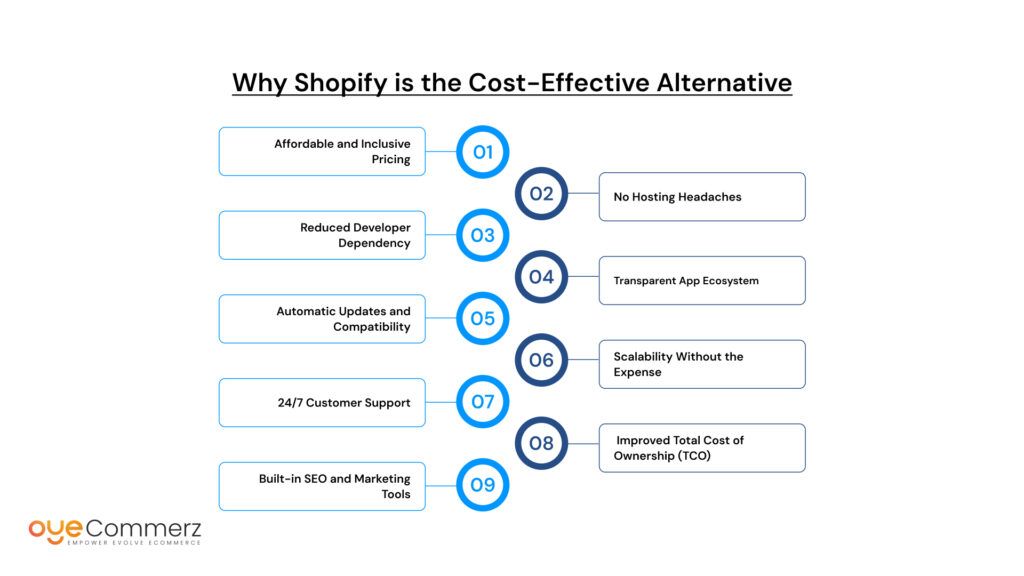
For businesses burdened by high maintenance costs in Shopware, Shopify offers a streamlined, cost-effective solution that eliminates many of the challenges associated with traditional e-commerce platforms. Here’s why Shopify stands out as the ideal alternative:
1. Affordable and Inclusive Pricing
Shopify simplifies budgeting with predictable pricing plans that include hosting, security, and essential features. Unlike Shopware, where hosting and maintenance costs can vary widely, Shopify’s all-in-one pricing model ensures no surprise expenses.
2. No Hosting Headaches
With Shopify, hosting is included in every plan. This means businesses don’t have to worry about managing servers, scaling resources, or handling performance optimizations during high-traffic periods.
3. Reduced Developer Dependency
Shopify’s intuitive interface allows business owners to make changes, add features, and customize their stores without relying heavily on developers. This significantly reduces ongoing technical costs compared to Shopware.
4. Transparent App Ecosystem
While Shopware relies heavily on plugins that often come with hidden costs, Shopify offers an extensive app store with transparent pricing. Apps are designed to integrate seamlessly, minimizing compatibility issues and additional expenses.
5. Automatic Updates and Compatibility
Shopify handles platform updates automatically, ensuring that your store remains up-to-date without requiring manual intervention. This eliminates the costs and disruptions associated with managing upgrades in Shopware.
6. Scalability Without the Expense
Whether you’re a small business or scaling to an enterprise-level store, Shopify grows with you. Its infrastructure is built to handle increased traffic and transactions without requiring expensive hosting upgrades or custom optimizations.
7. 24/7 Customer Support
Shopify offers round-the-clock customer support through chat, email, and phone. Unlike Shopware’s community-driven support model, Shopify provides immediate assistance to resolve issues quickly, reducing downtime and related costs.
8. Improved Total Cost of Ownership (TCO)
With Shopify, the combined cost of hosting, maintenance, and customization is often much lower than Shopware. This reduced TCO allows businesses to allocate resources to growth initiatives rather than technical upkeep.
9. Built-in SEO and Marketing Tools
Shopify includes essential SEO features, analytics, and marketing tools, eliminating the need for third-party integrations that can add to costs. These tools help businesses attract more customers and boost revenue without additional expenses.
Switching to Shopify is not just about cutting down on high maintenance costs in Shopware, it’s about investing in a platform that prioritizes simplicity, scalability, and growth. For businesses seeking a seamless and affordable e-commerce solution, Shopify is the clear winner.
For E-commerce Beginners: Why Shopify is a Smarter Start
If you’re new to the e-commerce world, navigating platforms like Shopware can feel overwhelming. While it offers robust features, its technical complexities might not be ideal for those just starting out. Here’s why Shopify is a better platform for e-commerce beginners:
1. Simplified Setup
Shopify is designed with ease of use in mind. Its step-by-step setup process allows even non-technical users to build a professional online store without requiring coding or specialized knowledge.
2. Predictable Costs
For beginners, budgeting is often a key concern. Shopify’s pricing plans are transparent and include hosting, security, and essential features. This predictability eliminates the surprise expenses often associated with Shopware.
3. User-Friendly Interface
Shopify’s intuitive dashboard makes managing your store simple. Tasks like adding products, customizing designs, and tracking orders are easy, even if you’re new to e-commerce.
4. Built-in Features
Unlike Shopware, which relies heavily on third-party plugins for basic functionality, Shopify comes with built-in features for SEO, analytics, and marketing. This reduces the need for additional tools and associated costs.
5. Reliable Customer Support
Starting an e-commerce business comes with a learning curve, and having reliable support is crucial. Shopify provides 24/7 customer support to help you resolve issues quickly, ensuring your store operates smoothly.
6. Scalability for Growth
As your business grows, Shopify grows with you. Its infrastructure is designed to handle increased traffic and sales without requiring costly upgrades or technical expertise, making it a great long-term solution.
7. Extensive Theme Library
Shopify offers a wide range of professionally designed themes, so you can create a visually appealing store without hiring a designer. Themes are mobile-responsive, ensuring your site looks great on any device.
8. Community and Resources
Shopify provides extensive documentation, tutorials, and an active community to support beginners. Whether you’re troubleshooting an issue or learning how to optimize your store, resources are readily available.
Why Avoid Shopware as a Beginner?
- Complexity: Shopware’s steep learning curve can be discouraging for first-time e-commerce entrepreneurs.
- Cost Overruns: The high maintenance costs in Shopware can quickly add up, especially if you’re unfamiliar with managing a self-hosted platform.
- Developer Dependency: Customizing your store or resolving technical issues often requires hiring developers, which can strain your budget.
Why Choose OyeCommerz for Your Migration to Shopify
When dealing with high maintenance costs in Shopware, migrating to Shopify can be a game-changer for your business. However, a successful migration requires expertise, precision, and a partner you can trust. That’s where OyeCommerz comes in.
1. Expertise in Shopware to Shopify Migration
At OyeCommerz, we specialize in seamless migration from Shopware to Shopify. Our team has in-depth experience with both platforms, ensuring a smooth transition without compromising your store’s functionality or customer experience.
2. Comprehensive Migration Services
We handle every aspect of the migration process, including:
- Transferring your product catalog, customer data, and order history.
- Migrating design elements to preserve your brand identity.
- Reconfiguring integrations with third-party tools and services.
- Testing and optimizing your new Shopify store for peak performance.
3. Custom Solutions Tailored to Your Needs
No two businesses are the same, and we understand that. OyeCommerz provides customized solutions to address your specific challenges, whether it’s simplifying complex integrations, improving store performance, or reducing ongoing costs.
4. Minimized Downtime
We know that downtime can hurt your business. Our migration process is designed to be efficient, ensuring your store remains operational and your customers experience minimal disruptions.
5. Cost Transparency and Affordability
With OyeCommerz, there are no hidden fees or surprises. We offer clear, upfront pricing and work to deliver cost-effective solutions that reduce your e-commerce platform’s total cost of ownership.
6. Post-Migration Support
Our support doesn’t end once the migration is complete. We provide ongoing assistance to help you navigate Shopify’s features, optimize your store, and ensure long-term success.
7. Proven Track Record
OyeCommerz has successfully helped numerous businesses overcome the challenges of high maintenance costs in Shopware by migrating to Shopify. Our clients consistently report improved performance, lower costs, and increased sales after switching platforms.
8. Focus on Growth
By partnering with OyeCommerz, you can shift your focus from managing technical challenges to growing your business. We take care of the migration details so you can concentrate on what matters most—your customers and revenue.
Ready to Make the Switch?
If high maintenance costs in Shopware are holding your business back, it’s time to explore a more cost-effective, scalable solution.
Contact us today to learn how we can make your migration to Shopify seamless and successful.
Contact to Migrate your Site to Shopify Now
Conclusion
The truth is clear: while Shopware offers flexibility, the high maintenance costs in Shopware can become a silent drain on your business resources. From frequent updates to ongoing developer reliance and hosting complexities, the price of managing a Shopware store extends far beyond the initial build. In contrast, Shopify is the cost-effective alternative that empowers businesses with reliability, ease of use, built-in features, and predictable expenses.
For growing brands and lean teams, Shopify removes the technical roadblocks and hidden costs that often slow down progress. With faster onboarding, lower overhead, and unmatched scalability, it’s no surprise more store owners are making the switch.
If your goal is to focus on growth instead of maintenance tickets, now’s the time to evaluate what your platform is really costing you. Because in the long run, Shopify is the cost-effective choice that saves money—and sanity.
Frequently Asked Questions
Shopware often requires frequent developer support, custom updates, third-party hosting, and manual troubleshooting, all of which add up over time.
Yes, Shopify includes hosting, security, updates, and support in a single monthly fee, making it more predictable and cost-effective.
Hidden costs include developer fees, plugin conflicts, hosting charges, server management, and time spent on technical upkeep.
Shopify offers a simpler, scalable solution with lower maintenance, faster setup, and built-in tools that reduce ongoing costs and complexity.
Shopify reduces costs by bundling everything—hosting, security, updates—into one plan, eliminating the need for constant technical intervention.

